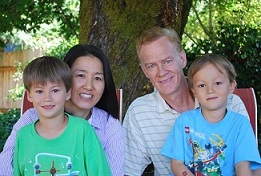
The Tagalog Project: The Tagalog project in the Philippines continues to go very well. Tod Allman and Ephraim Rey meet three or four mornings each week in order to develop their Tagalog lexicon and grammar. They’ve finished the book of Ruth, and it’s now being tested for quality. They will begin working through the book of Luke in early June. As has been mentioned in previous newsletters, the pace of their translation work continues to accelerate. As the Tagalog lexicon and grammar become more developed, they’re able to work through larger passages during each two hour meeting. Please pray that God will protect this work from all hindrances, and that Tod and Ephraim will be able to finish the book of Luke quickly. Then Tod will begin working in a related language that doesn’t yet have any part of the Bible.
If you speak Tagalog, you can see our software’s translation of “Ruth” and “Infected Eye” on the Texts page of our web site (http://www.thebibletranslatorsassistant.org/TBTAsTexts.aspx). Select “Tagalog” in the language dropdown, and you’ll see the texts produced by our software.
Analyzing the Entire Bible: Our semantic representations are the source documents that our software uses when producing translations of the Bible. While we continue to make steady progress in developing our semantic representations using the traditional method, we would like to develop a more efficient technique. We have received permission from Mission Assist (formerly Wycliffe Associates, UK) to use their Easy English (EE) translation as a starting point for building our semantic representations. Mission Assist has already produced the entire Bible, a set of commentaries, and Bible study materials using their Easy English vocabulary and sentence structures. You can see their materials at http://www.easyenglish.info/. EE uses some of the same restrictions that we at TBTA employ. For instance, their texts are composed using a restricted set of simple English vocabulary, they use only simple English sentence structures, they convert all rhetorical questions to statements, etc. Our prayer is that by using EE’s texts as the starting point for building our semantic representations, we will be able to develop the necessary representations for the entire Bible in much less time than would be required otherwise. In order to do this, we want to automate as much of the process as possible for converting the EE texts to our semantic representations. So we’re developing software that will perform word sense disambiguation, identify clause and phrase boundaries, and resolve pronoun references. We are currently investigating rule based approaches and statistical techniques to perform these steps of the conversion process automatically. We hope to have positive results within a few months. If the process works well, we will be able to build semantic representations of EE’s Bible, commentaries, and Bible study materials very quickly. Then our software will be able to help produce initial draft translations of all these materials.
TBTA-Philippines: The Tagalog project in the Philippines is going very well, so we at TBTA have decided to form TBTA-Philippines. We’ve begun the legal process of incorporating in the Philippines so that our organization will be recognized by the Philippine government. Developing this organization will help us establish relationships with Filipinos who are interested in Bible translation. Three board members have been selected, and we’re looking for two more. After incorporating, the board’s first task will be to develop a strategy for maximizing the benefits of our translation tool amongst the languages in the Philippines. Our hope is that after the Tagalog grammar is well developed, we’ll be able to easily modify it to accommodate the other structurally similar languages spoken throughout the country. Please pray that God will give us wisdom as we assemble our board of directors, and that we’ll develop good relationships with people who long for the Bible in their own language.
A Request: Tod Allman and his family do not have sufficient financial support for living in the Philippines long term. They have received many generous one time donations, but they need monthly income to work there long term. If you believe that computer-assisted Bible translation is valuable, and if you’d like to see many different people groups in the Philippines receive God’s Word in their own language, would you please consider supporting Tod and his family through small monthly donations. If twenty new families or individuals would donate $25 per month, Tod and his family would be able to make ends meet in the Philippines. We appreciate your consideration. The most convenient way to donate is at TBTA’s web site on the Donations page (http://www.thebibletranslatorsassistant.org/Donations.aspx). All donations are tax deductible and greatly appreciated. You will receive a receipt for every donation.
![]()

The People of the Philippines: There are a little over 100 million people living in the Philippines, and that number is growing rapidly at a rate of more than 20,000 people per day. The country consists of more than 7,100 islands, and is home to some of the world’s most beautiful beaches and spectacular mountain views. At the time of World War II, the Filipino economy was the second largest in Asia, behind only Japan. However, during the past six decades, the country’s economy has gradually deteriorated for a variety of reasons. The Philippines’ poverty line is set at an annual per capita income of just $378 (about $1 per day), but more than one fourth of the country’s population is living below the poverty line. Severe poverty is a significant social issue throughout the country, but no one has any viable solutions. Numerous organizations from other countries are pouring their resources into the Philippines with a hope for a brighter future. Please pray that God will somehow help the millions and millions of people here who are living in severe poverty.


